Business Law: Agency, Usual Authority, and Separate Legal Entity
VerifiedAdded on 2023/06/12
|11
|2376
|140
AI Summary
This article discusses the principles of agency, usual authority, and separate legal entity in business law. It covers issues such as remuneration for jewelry, liability for gold purchase, and personal liability for company debts.
Contribute Materials
Your contribution can guide someone’s learning journey. Share your
documents today.
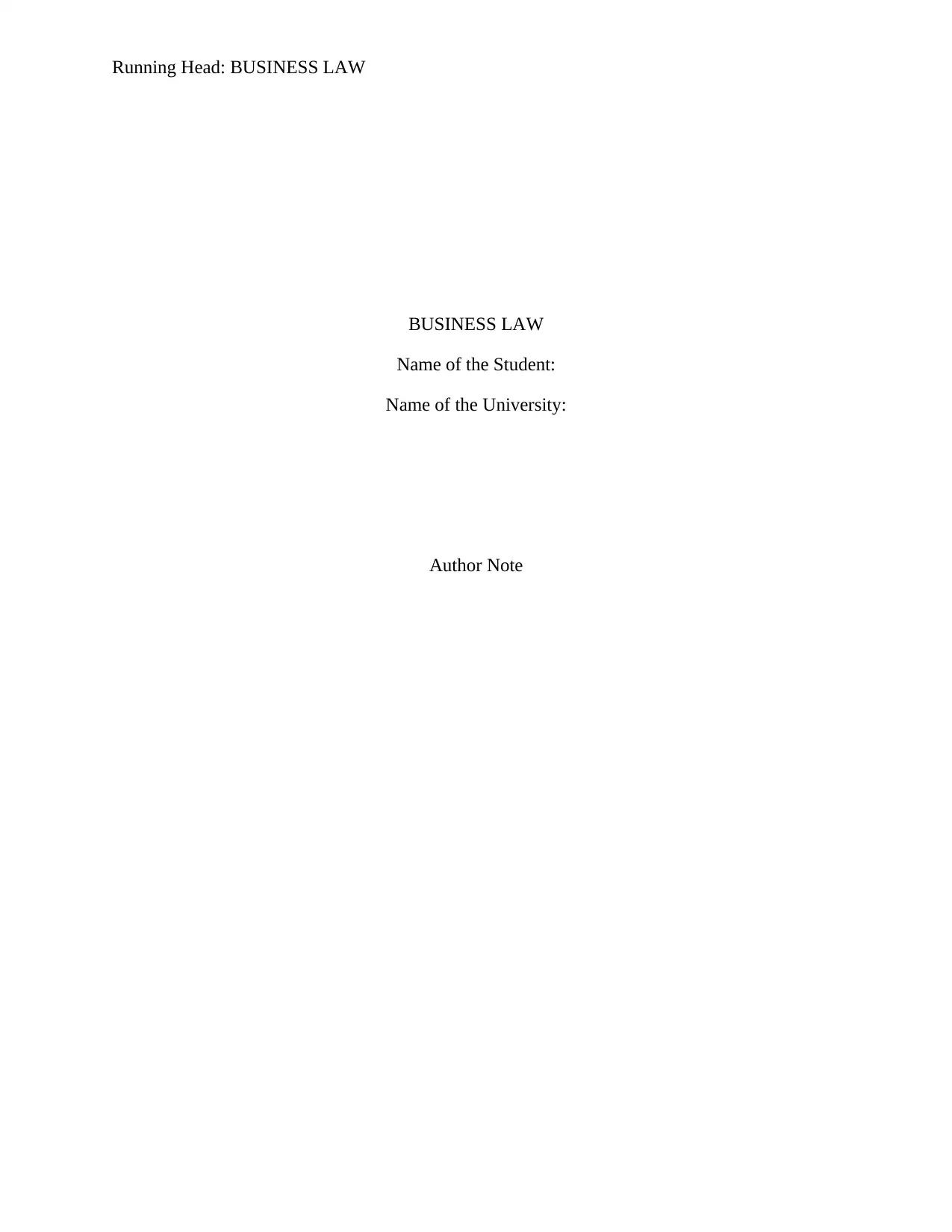
Running Head: BUSINESS LAW
BUSINESS LAW
Name of the Student:
Name of the University:
Author Note
BUSINESS LAW
Name of the Student:
Name of the University:
Author Note
Secure Best Marks with AI Grader
Need help grading? Try our AI Grader for instant feedback on your assignments.
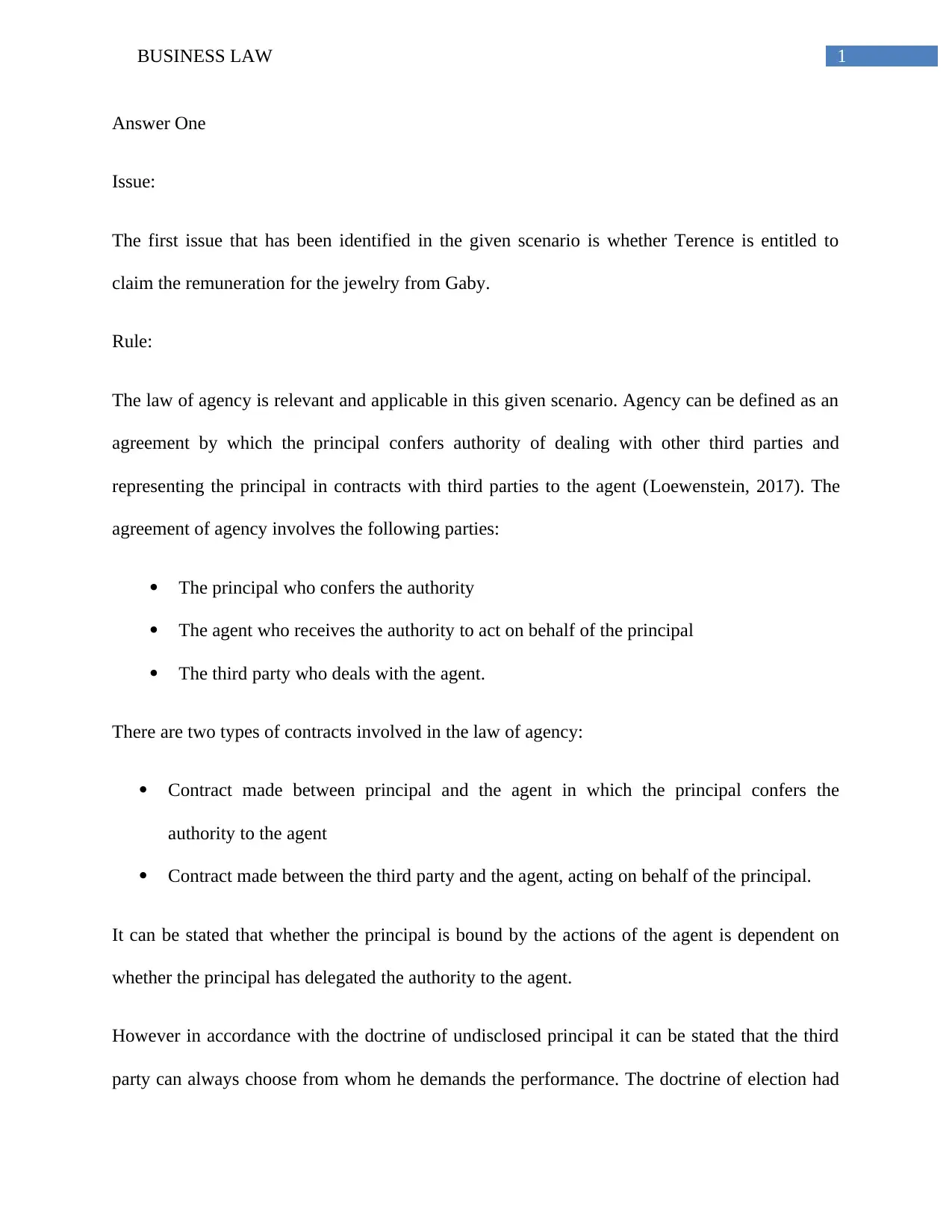
1BUSINESS LAW
Answer One
Issue:
The first issue that has been identified in the given scenario is whether Terence is entitled to
claim the remuneration for the jewelry from Gaby.
Rule:
The law of agency is relevant and applicable in this given scenario. Agency can be defined as an
agreement by which the principal confers authority of dealing with other third parties and
representing the principal in contracts with third parties to the agent (Loewenstein, 2017). The
agreement of agency involves the following parties:
The principal who confers the authority
The agent who receives the authority to act on behalf of the principal
The third party who deals with the agent.
There are two types of contracts involved in the law of agency:
Contract made between principal and the agent in which the principal confers the
authority to the agent
Contract made between the third party and the agent, acting on behalf of the principal.
It can be stated that whether the principal is bound by the actions of the agent is dependent on
whether the principal has delegated the authority to the agent.
However in accordance with the doctrine of undisclosed principal it can be stated that the third
party can always choose from whom he demands the performance. The doctrine of election had
Answer One
Issue:
The first issue that has been identified in the given scenario is whether Terence is entitled to
claim the remuneration for the jewelry from Gaby.
Rule:
The law of agency is relevant and applicable in this given scenario. Agency can be defined as an
agreement by which the principal confers authority of dealing with other third parties and
representing the principal in contracts with third parties to the agent (Loewenstein, 2017). The
agreement of agency involves the following parties:
The principal who confers the authority
The agent who receives the authority to act on behalf of the principal
The third party who deals with the agent.
There are two types of contracts involved in the law of agency:
Contract made between principal and the agent in which the principal confers the
authority to the agent
Contract made between the third party and the agent, acting on behalf of the principal.
It can be stated that whether the principal is bound by the actions of the agent is dependent on
whether the principal has delegated the authority to the agent.
However in accordance with the doctrine of undisclosed principal it can be stated that the third
party can always choose from whom he demands the performance. The doctrine of election had
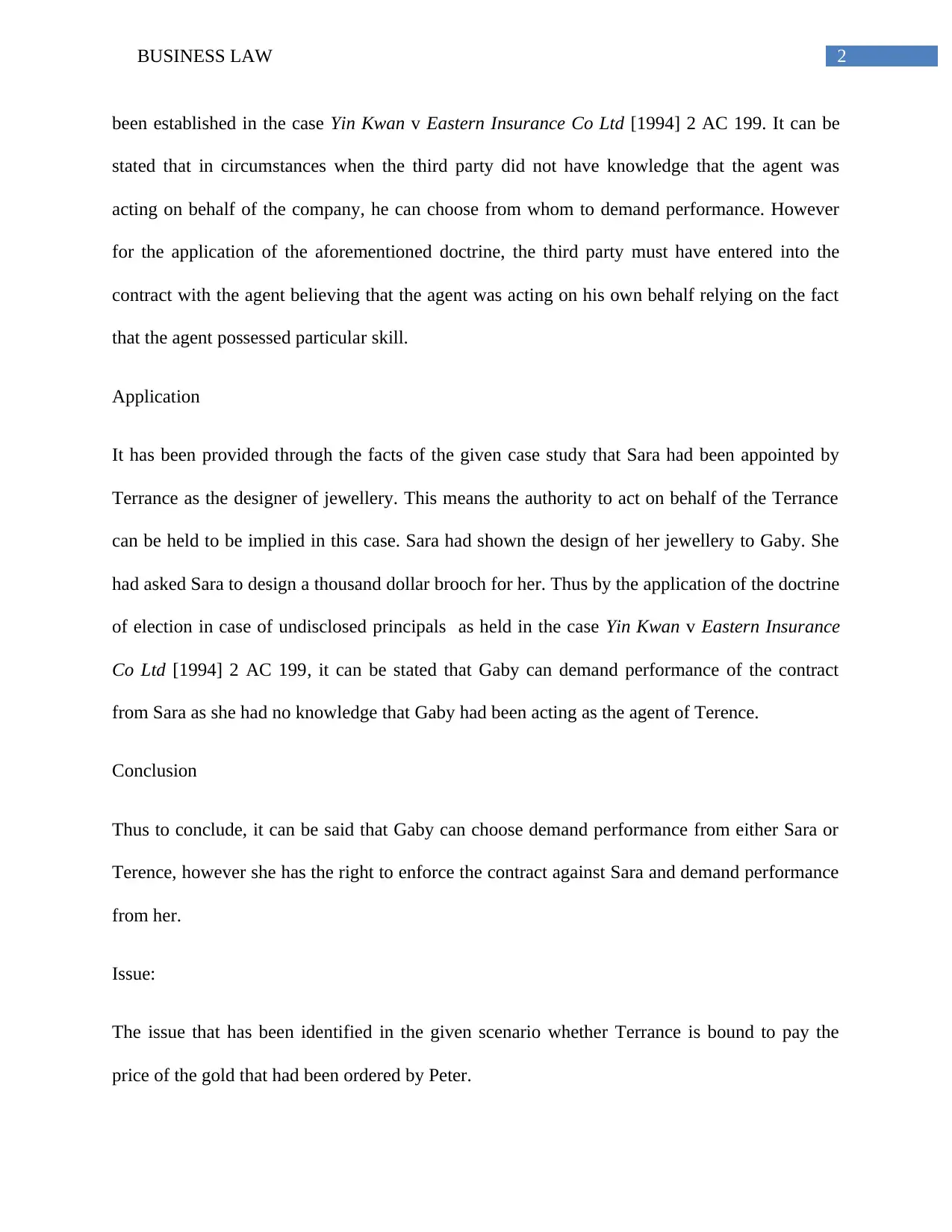
2BUSINESS LAW
been established in the case Yin Kwan v Eastern Insurance Co Ltd [1994] 2 AC 199. It can be
stated that in circumstances when the third party did not have knowledge that the agent was
acting on behalf of the company, he can choose from whom to demand performance. However
for the application of the aforementioned doctrine, the third party must have entered into the
contract with the agent believing that the agent was acting on his own behalf relying on the fact
that the agent possessed particular skill.
Application
It has been provided through the facts of the given case study that Sara had been appointed by
Terrance as the designer of jewellery. This means the authority to act on behalf of the Terrance
can be held to be implied in this case. Sara had shown the design of her jewellery to Gaby. She
had asked Sara to design a thousand dollar brooch for her. Thus by the application of the doctrine
of election in case of undisclosed principals as held in the case Yin Kwan v Eastern Insurance
Co Ltd [1994] 2 AC 199, it can be stated that Gaby can demand performance of the contract
from Sara as she had no knowledge that Gaby had been acting as the agent of Terence.
Conclusion
Thus to conclude, it can be said that Gaby can choose demand performance from either Sara or
Terence, however she has the right to enforce the contract against Sara and demand performance
from her.
Issue:
The issue that has been identified in the given scenario whether Terrance is bound to pay the
price of the gold that had been ordered by Peter.
been established in the case Yin Kwan v Eastern Insurance Co Ltd [1994] 2 AC 199. It can be
stated that in circumstances when the third party did not have knowledge that the agent was
acting on behalf of the company, he can choose from whom to demand performance. However
for the application of the aforementioned doctrine, the third party must have entered into the
contract with the agent believing that the agent was acting on his own behalf relying on the fact
that the agent possessed particular skill.
Application
It has been provided through the facts of the given case study that Sara had been appointed by
Terrance as the designer of jewellery. This means the authority to act on behalf of the Terrance
can be held to be implied in this case. Sara had shown the design of her jewellery to Gaby. She
had asked Sara to design a thousand dollar brooch for her. Thus by the application of the doctrine
of election in case of undisclosed principals as held in the case Yin Kwan v Eastern Insurance
Co Ltd [1994] 2 AC 199, it can be stated that Gaby can demand performance of the contract
from Sara as she had no knowledge that Gaby had been acting as the agent of Terence.
Conclusion
Thus to conclude, it can be said that Gaby can choose demand performance from either Sara or
Terence, however she has the right to enforce the contract against Sara and demand performance
from her.
Issue:
The issue that has been identified in the given scenario whether Terrance is bound to pay the
price of the gold that had been ordered by Peter.
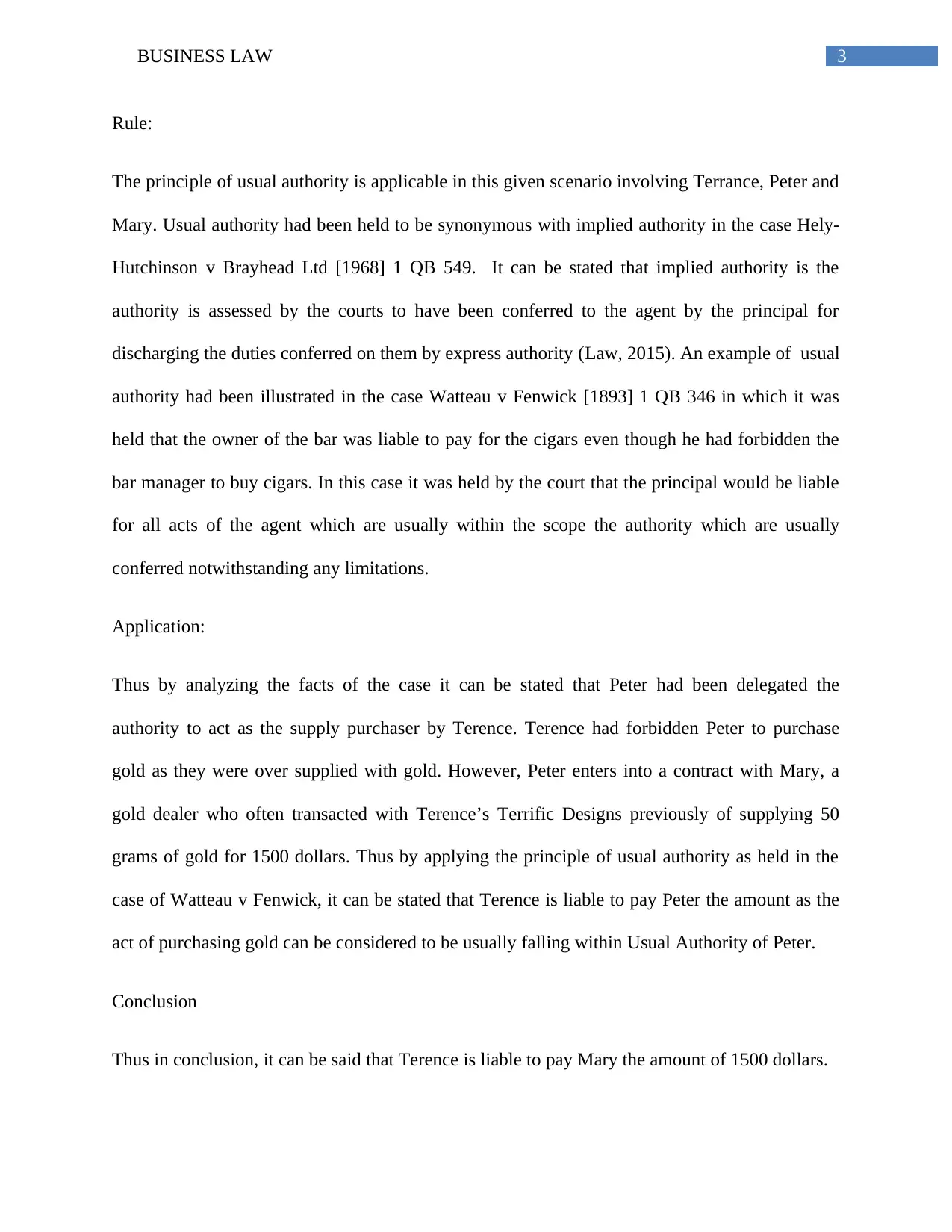
3BUSINESS LAW
Rule:
The principle of usual authority is applicable in this given scenario involving Terrance, Peter and
Mary. Usual authority had been held to be synonymous with implied authority in the case Hely-
Hutchinson v Brayhead Ltd [1968] 1 QB 549. It can be stated that implied authority is the
authority is assessed by the courts to have been conferred to the agent by the principal for
discharging the duties conferred on them by express authority (Law, 2015). An example of usual
authority had been illustrated in the case Watteau v Fenwick [1893] 1 QB 346 in which it was
held that the owner of the bar was liable to pay for the cigars even though he had forbidden the
bar manager to buy cigars. In this case it was held by the court that the principal would be liable
for all acts of the agent which are usually within the scope the authority which are usually
conferred notwithstanding any limitations.
Application:
Thus by analyzing the facts of the case it can be stated that Peter had been delegated the
authority to act as the supply purchaser by Terence. Terence had forbidden Peter to purchase
gold as they were over supplied with gold. However, Peter enters into a contract with Mary, a
gold dealer who often transacted with Terence’s Terrific Designs previously of supplying 50
grams of gold for 1500 dollars. Thus by applying the principle of usual authority as held in the
case of Watteau v Fenwick, it can be stated that Terence is liable to pay Peter the amount as the
act of purchasing gold can be considered to be usually falling within Usual Authority of Peter.
Conclusion
Thus in conclusion, it can be said that Terence is liable to pay Mary the amount of 1500 dollars.
Rule:
The principle of usual authority is applicable in this given scenario involving Terrance, Peter and
Mary. Usual authority had been held to be synonymous with implied authority in the case Hely-
Hutchinson v Brayhead Ltd [1968] 1 QB 549. It can be stated that implied authority is the
authority is assessed by the courts to have been conferred to the agent by the principal for
discharging the duties conferred on them by express authority (Law, 2015). An example of usual
authority had been illustrated in the case Watteau v Fenwick [1893] 1 QB 346 in which it was
held that the owner of the bar was liable to pay for the cigars even though he had forbidden the
bar manager to buy cigars. In this case it was held by the court that the principal would be liable
for all acts of the agent which are usually within the scope the authority which are usually
conferred notwithstanding any limitations.
Application:
Thus by analyzing the facts of the case it can be stated that Peter had been delegated the
authority to act as the supply purchaser by Terence. Terence had forbidden Peter to purchase
gold as they were over supplied with gold. However, Peter enters into a contract with Mary, a
gold dealer who often transacted with Terence’s Terrific Designs previously of supplying 50
grams of gold for 1500 dollars. Thus by applying the principle of usual authority as held in the
case of Watteau v Fenwick, it can be stated that Terence is liable to pay Peter the amount as the
act of purchasing gold can be considered to be usually falling within Usual Authority of Peter.
Conclusion
Thus in conclusion, it can be said that Terence is liable to pay Mary the amount of 1500 dollars.
Secure Best Marks with AI Grader
Need help grading? Try our AI Grader for instant feedback on your assignments.
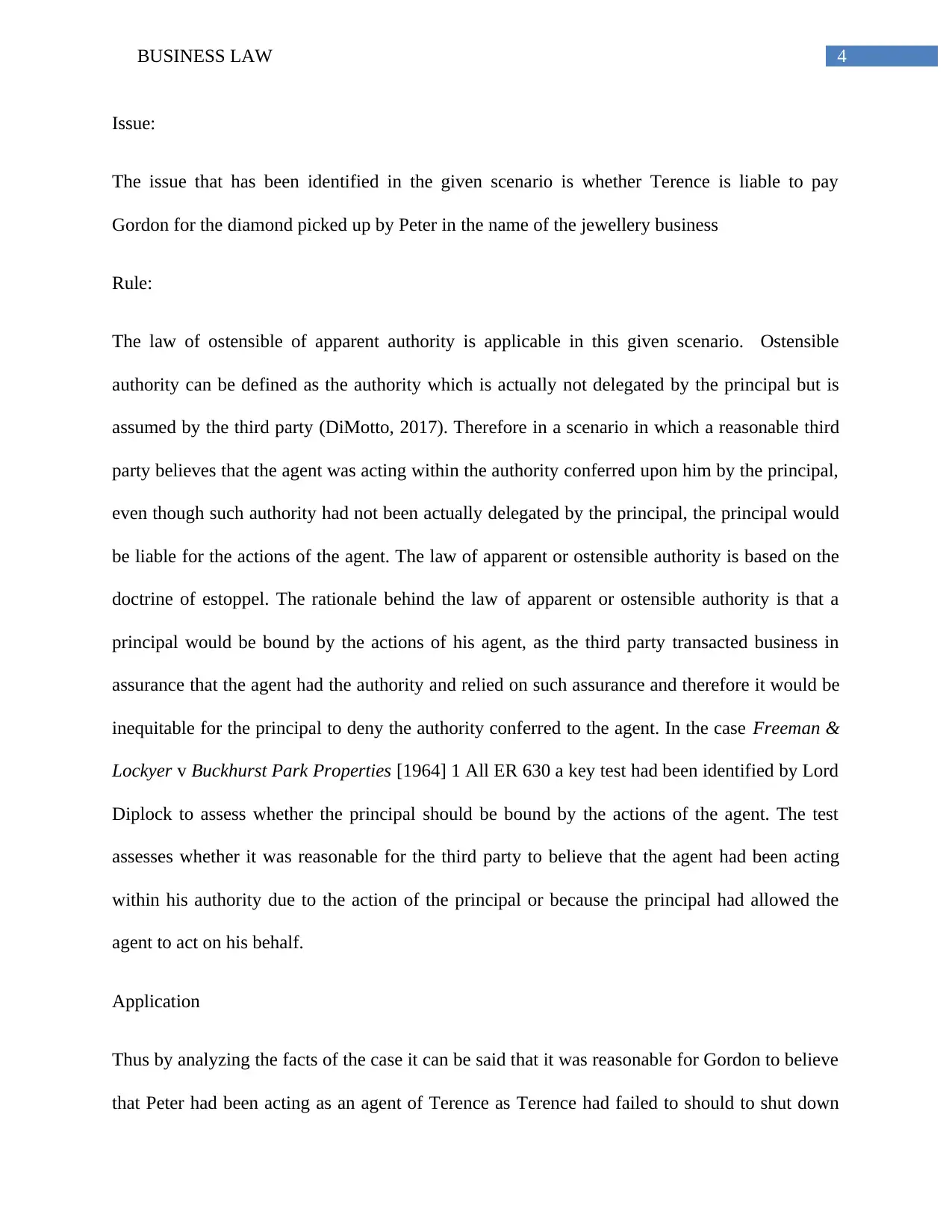
4BUSINESS LAW
Issue:
The issue that has been identified in the given scenario is whether Terence is liable to pay
Gordon for the diamond picked up by Peter in the name of the jewellery business
Rule:
The law of ostensible of apparent authority is applicable in this given scenario. Ostensible
authority can be defined as the authority which is actually not delegated by the principal but is
assumed by the third party (DiMotto, 2017). Therefore in a scenario in which a reasonable third
party believes that the agent was acting within the authority conferred upon him by the principal,
even though such authority had not been actually delegated by the principal, the principal would
be liable for the actions of the agent. The law of apparent or ostensible authority is based on the
doctrine of estoppel. The rationale behind the law of apparent or ostensible authority is that a
principal would be bound by the actions of his agent, as the third party transacted business in
assurance that the agent had the authority and relied on such assurance and therefore it would be
inequitable for the principal to deny the authority conferred to the agent. In the case Freeman &
Lockyer v Buckhurst Park Properties [1964] 1 All ER 630 a key test had been identified by Lord
Diplock to assess whether the principal should be bound by the actions of the agent. The test
assesses whether it was reasonable for the third party to believe that the agent had been acting
within his authority due to the action of the principal or because the principal had allowed the
agent to act on his behalf.
Application
Thus by analyzing the facts of the case it can be said that it was reasonable for Gordon to believe
that Peter had been acting as an agent of Terence as Terence had failed to should to shut down
Issue:
The issue that has been identified in the given scenario is whether Terence is liable to pay
Gordon for the diamond picked up by Peter in the name of the jewellery business
Rule:
The law of ostensible of apparent authority is applicable in this given scenario. Ostensible
authority can be defined as the authority which is actually not delegated by the principal but is
assumed by the third party (DiMotto, 2017). Therefore in a scenario in which a reasonable third
party believes that the agent was acting within the authority conferred upon him by the principal,
even though such authority had not been actually delegated by the principal, the principal would
be liable for the actions of the agent. The law of apparent or ostensible authority is based on the
doctrine of estoppel. The rationale behind the law of apparent or ostensible authority is that a
principal would be bound by the actions of his agent, as the third party transacted business in
assurance that the agent had the authority and relied on such assurance and therefore it would be
inequitable for the principal to deny the authority conferred to the agent. In the case Freeman &
Lockyer v Buckhurst Park Properties [1964] 1 All ER 630 a key test had been identified by Lord
Diplock to assess whether the principal should be bound by the actions of the agent. The test
assesses whether it was reasonable for the third party to believe that the agent had been acting
within his authority due to the action of the principal or because the principal had allowed the
agent to act on his behalf.
Application
Thus by analyzing the facts of the case it can be said that it was reasonable for Gordon to believe
that Peter had been acting as an agent of Terence as Terence had failed to should to shut down
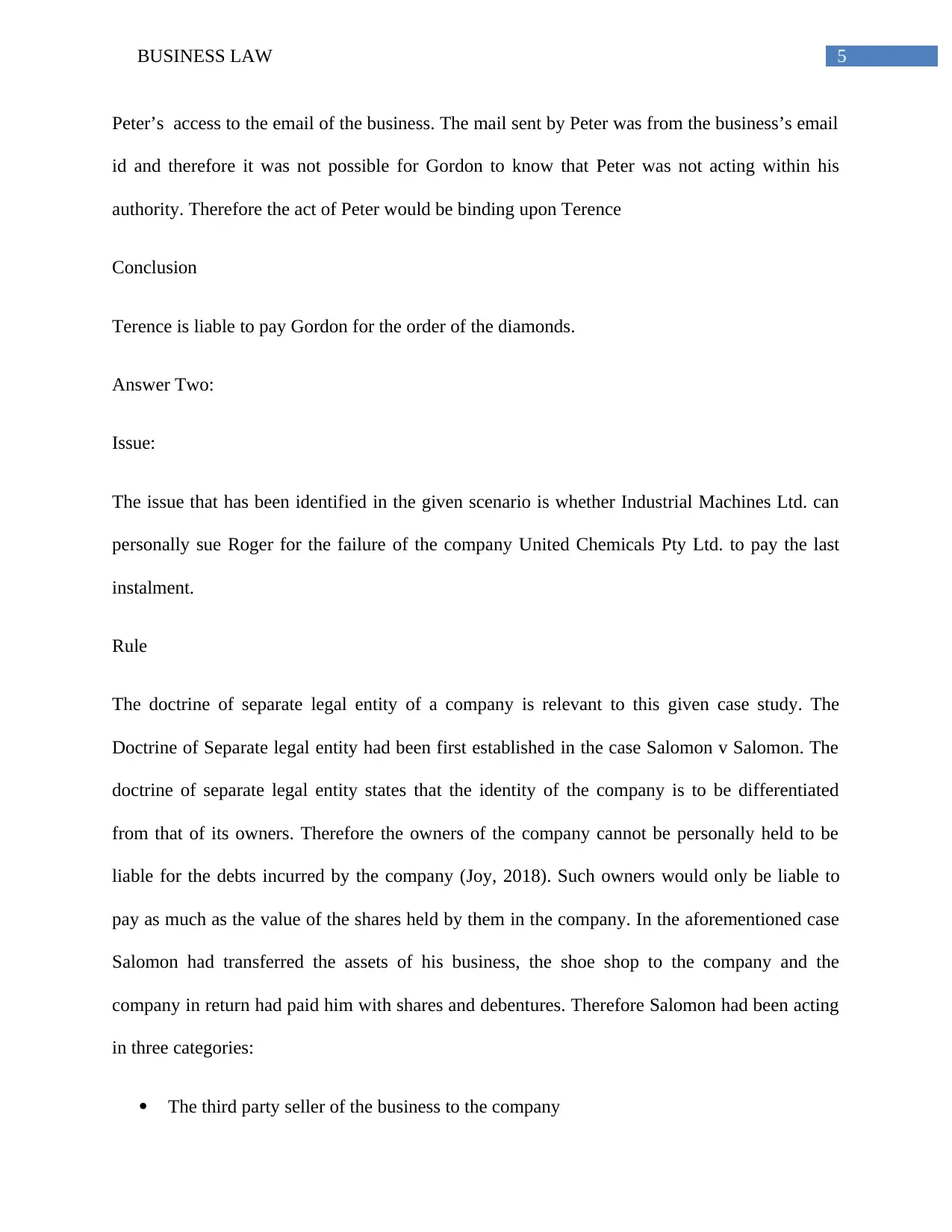
5BUSINESS LAW
Peter’s access to the email of the business. The mail sent by Peter was from the business’s email
id and therefore it was not possible for Gordon to know that Peter was not acting within his
authority. Therefore the act of Peter would be binding upon Terence
Conclusion
Terence is liable to pay Gordon for the order of the diamonds.
Answer Two:
Issue:
The issue that has been identified in the given scenario is whether Industrial Machines Ltd. can
personally sue Roger for the failure of the company United Chemicals Pty Ltd. to pay the last
instalment.
Rule
The doctrine of separate legal entity of a company is relevant to this given case study. The
Doctrine of Separate legal entity had been first established in the case Salomon v Salomon. The
doctrine of separate legal entity states that the identity of the company is to be differentiated
from that of its owners. Therefore the owners of the company cannot be personally held to be
liable for the debts incurred by the company (Joy, 2018). Such owners would only be liable to
pay as much as the value of the shares held by them in the company. In the aforementioned case
Salomon had transferred the assets of his business, the shoe shop to the company and the
company in return had paid him with shares and debentures. Therefore Salomon had been acting
in three categories:
The third party seller of the business to the company
Peter’s access to the email of the business. The mail sent by Peter was from the business’s email
id and therefore it was not possible for Gordon to know that Peter was not acting within his
authority. Therefore the act of Peter would be binding upon Terence
Conclusion
Terence is liable to pay Gordon for the order of the diamonds.
Answer Two:
Issue:
The issue that has been identified in the given scenario is whether Industrial Machines Ltd. can
personally sue Roger for the failure of the company United Chemicals Pty Ltd. to pay the last
instalment.
Rule
The doctrine of separate legal entity of a company is relevant to this given case study. The
Doctrine of Separate legal entity had been first established in the case Salomon v Salomon. The
doctrine of separate legal entity states that the identity of the company is to be differentiated
from that of its owners. Therefore the owners of the company cannot be personally held to be
liable for the debts incurred by the company (Joy, 2018). Such owners would only be liable to
pay as much as the value of the shares held by them in the company. In the aforementioned case
Salomon had transferred the assets of his business, the shoe shop to the company and the
company in return had paid him with shares and debentures. Therefore Salomon had been acting
in three categories:
The third party seller of the business to the company
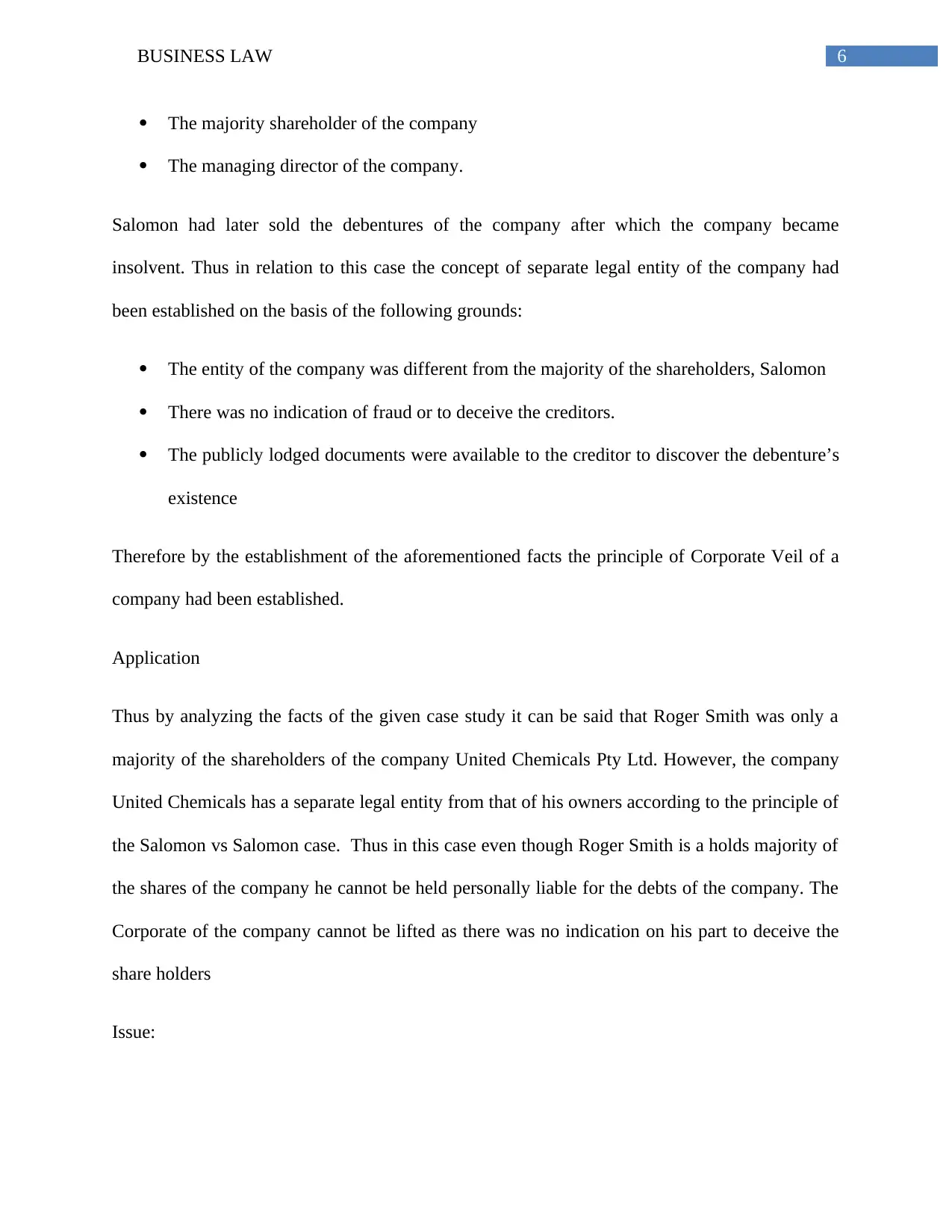
6BUSINESS LAW
The majority shareholder of the company
The managing director of the company.
Salomon had later sold the debentures of the company after which the company became
insolvent. Thus in relation to this case the concept of separate legal entity of the company had
been established on the basis of the following grounds:
The entity of the company was different from the majority of the shareholders, Salomon
There was no indication of fraud or to deceive the creditors.
The publicly lodged documents were available to the creditor to discover the debenture’s
existence
Therefore by the establishment of the aforementioned facts the principle of Corporate Veil of a
company had been established.
Application
Thus by analyzing the facts of the given case study it can be said that Roger Smith was only a
majority of the shareholders of the company United Chemicals Pty Ltd. However, the company
United Chemicals has a separate legal entity from that of his owners according to the principle of
the Salomon vs Salomon case. Thus in this case even though Roger Smith is a holds majority of
the shares of the company he cannot be held personally liable for the debts of the company. The
Corporate of the company cannot be lifted as there was no indication on his part to deceive the
share holders
Issue:
The majority shareholder of the company
The managing director of the company.
Salomon had later sold the debentures of the company after which the company became
insolvent. Thus in relation to this case the concept of separate legal entity of the company had
been established on the basis of the following grounds:
The entity of the company was different from the majority of the shareholders, Salomon
There was no indication of fraud or to deceive the creditors.
The publicly lodged documents were available to the creditor to discover the debenture’s
existence
Therefore by the establishment of the aforementioned facts the principle of Corporate Veil of a
company had been established.
Application
Thus by analyzing the facts of the given case study it can be said that Roger Smith was only a
majority of the shareholders of the company United Chemicals Pty Ltd. However, the company
United Chemicals has a separate legal entity from that of his owners according to the principle of
the Salomon vs Salomon case. Thus in this case even though Roger Smith is a holds majority of
the shares of the company he cannot be held personally liable for the debts of the company. The
Corporate of the company cannot be lifted as there was no indication on his part to deceive the
share holders
Issue:
Paraphrase This Document
Need a fresh take? Get an instant paraphrase of this document with our AI Paraphraser
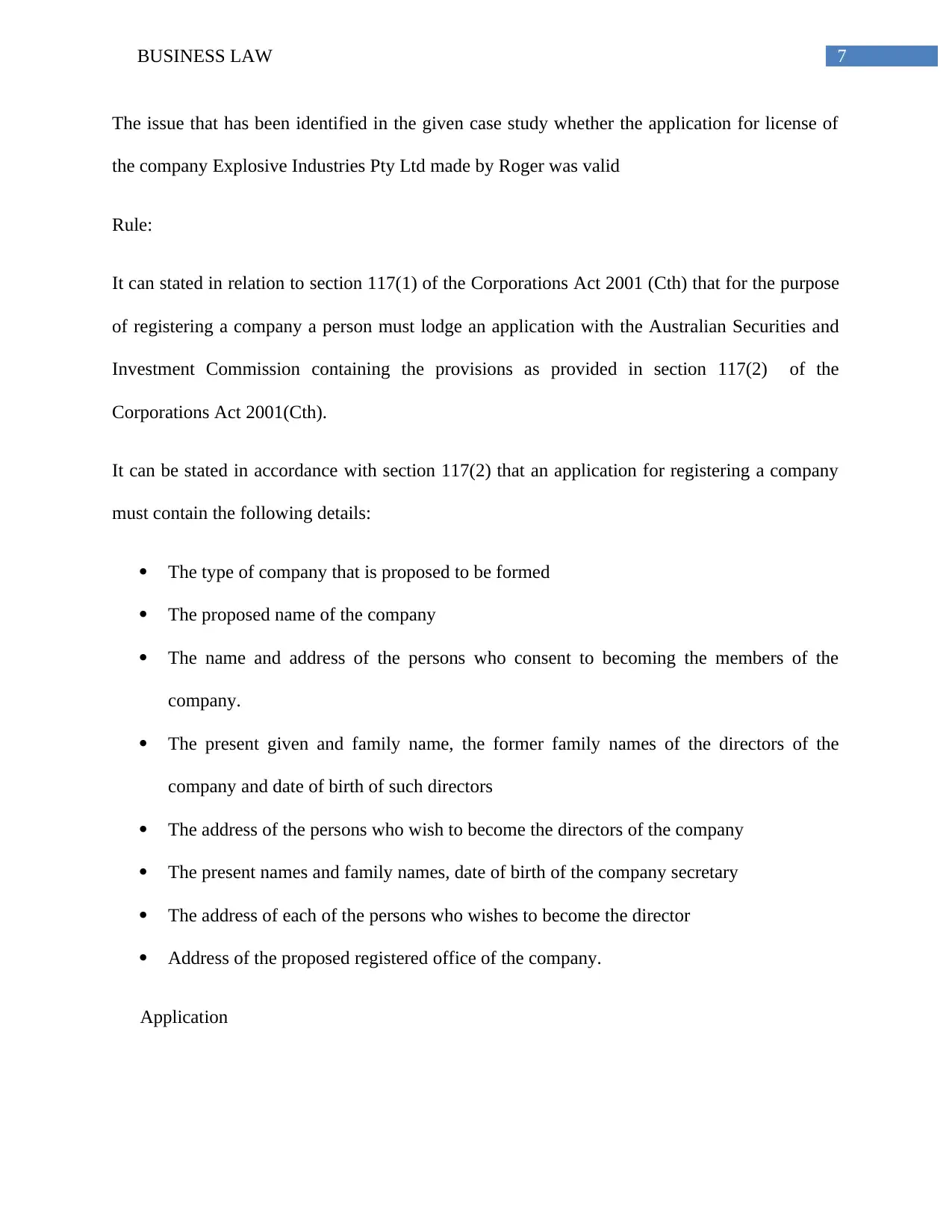
7BUSINESS LAW
The issue that has been identified in the given case study whether the application for license of
the company Explosive Industries Pty Ltd made by Roger was valid
Rule:
It can stated in relation to section 117(1) of the Corporations Act 2001 (Cth) that for the purpose
of registering a company a person must lodge an application with the Australian Securities and
Investment Commission containing the provisions as provided in section 117(2) of the
Corporations Act 2001(Cth).
It can be stated in accordance with section 117(2) that an application for registering a company
must contain the following details:
The type of company that is proposed to be formed
The proposed name of the company
The name and address of the persons who consent to becoming the members of the
company.
The present given and family name, the former family names of the directors of the
company and date of birth of such directors
The address of the persons who wish to become the directors of the company
The present names and family names, date of birth of the company secretary
The address of each of the persons who wishes to become the director
Address of the proposed registered office of the company.
Application
The issue that has been identified in the given case study whether the application for license of
the company Explosive Industries Pty Ltd made by Roger was valid
Rule:
It can stated in relation to section 117(1) of the Corporations Act 2001 (Cth) that for the purpose
of registering a company a person must lodge an application with the Australian Securities and
Investment Commission containing the provisions as provided in section 117(2) of the
Corporations Act 2001(Cth).
It can be stated in accordance with section 117(2) that an application for registering a company
must contain the following details:
The type of company that is proposed to be formed
The proposed name of the company
The name and address of the persons who consent to becoming the members of the
company.
The present given and family name, the former family names of the directors of the
company and date of birth of such directors
The address of the persons who wish to become the directors of the company
The present names and family names, date of birth of the company secretary
The address of each of the persons who wishes to become the director
Address of the proposed registered office of the company.
Application
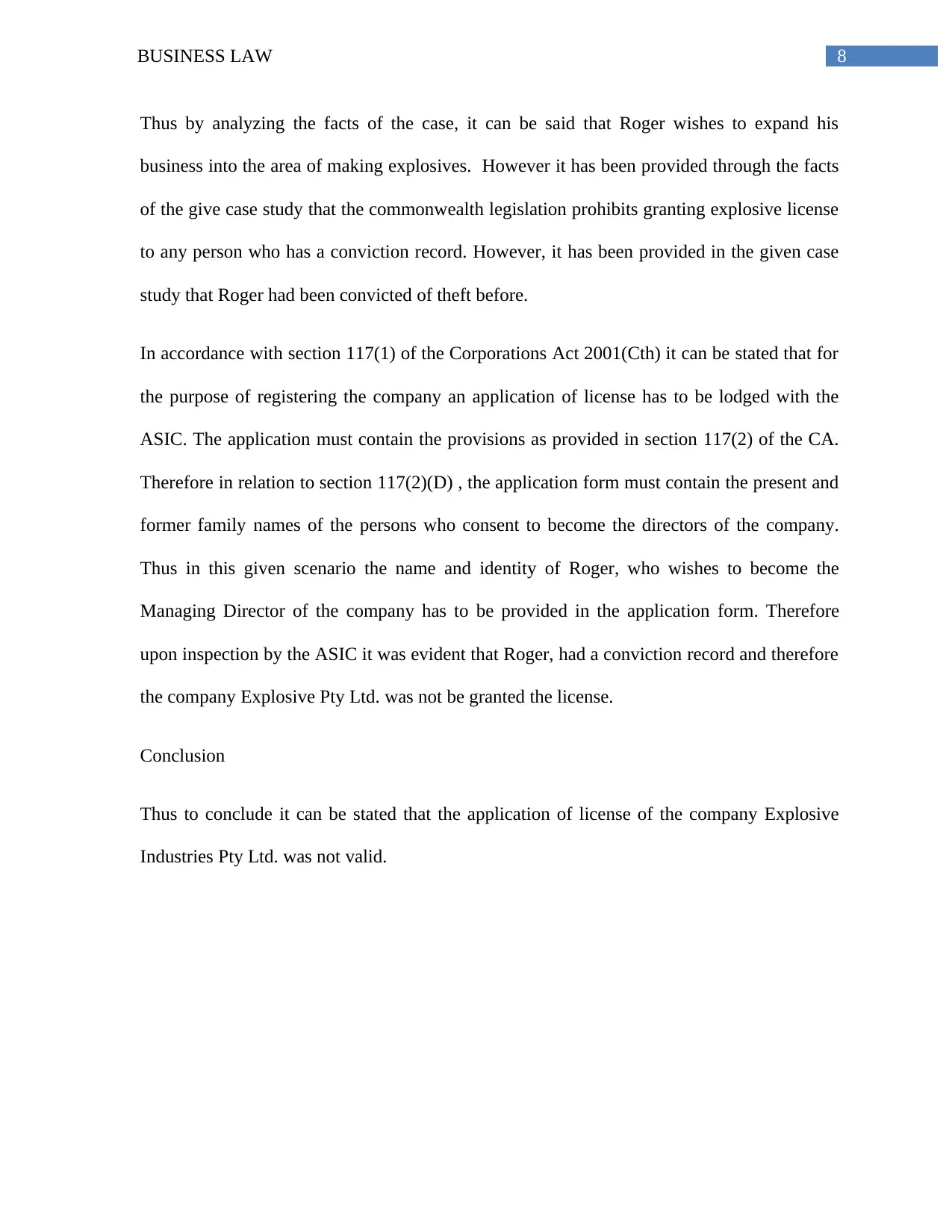
8BUSINESS LAW
Thus by analyzing the facts of the case, it can be said that Roger wishes to expand his
business into the area of making explosives. However it has been provided through the facts
of the give case study that the commonwealth legislation prohibits granting explosive license
to any person who has a conviction record. However, it has been provided in the given case
study that Roger had been convicted of theft before.
In accordance with section 117(1) of the Corporations Act 2001(Cth) it can be stated that for
the purpose of registering the company an application of license has to be lodged with the
ASIC. The application must contain the provisions as provided in section 117(2) of the CA.
Therefore in relation to section 117(2)(D) , the application form must contain the present and
former family names of the persons who consent to become the directors of the company.
Thus in this given scenario the name and identity of Roger, who wishes to become the
Managing Director of the company has to be provided in the application form. Therefore
upon inspection by the ASIC it was evident that Roger, had a conviction record and therefore
the company Explosive Pty Ltd. was not be granted the license.
Conclusion
Thus to conclude it can be stated that the application of license of the company Explosive
Industries Pty Ltd. was not valid.
Thus by analyzing the facts of the case, it can be said that Roger wishes to expand his
business into the area of making explosives. However it has been provided through the facts
of the give case study that the commonwealth legislation prohibits granting explosive license
to any person who has a conviction record. However, it has been provided in the given case
study that Roger had been convicted of theft before.
In accordance with section 117(1) of the Corporations Act 2001(Cth) it can be stated that for
the purpose of registering the company an application of license has to be lodged with the
ASIC. The application must contain the provisions as provided in section 117(2) of the CA.
Therefore in relation to section 117(2)(D) , the application form must contain the present and
former family names of the persons who consent to become the directors of the company.
Thus in this given scenario the name and identity of Roger, who wishes to become the
Managing Director of the company has to be provided in the application form. Therefore
upon inspection by the ASIC it was evident that Roger, had a conviction record and therefore
the company Explosive Pty Ltd. was not be granted the license.
Conclusion
Thus to conclude it can be stated that the application of license of the company Explosive
Industries Pty Ltd. was not valid.
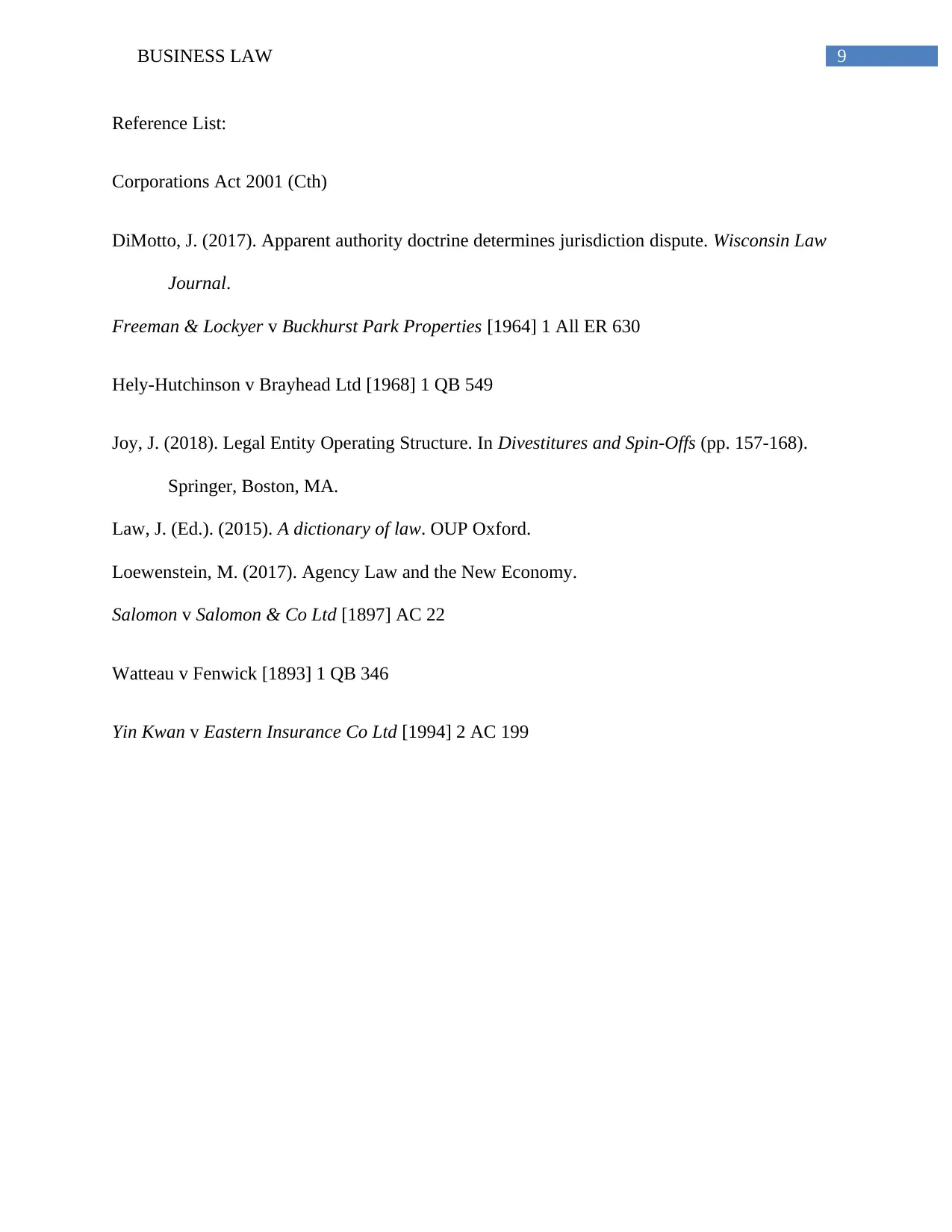
9BUSINESS LAW
Reference List:
Corporations Act 2001 (Cth)
DiMotto, J. (2017). Apparent authority doctrine determines jurisdiction dispute. Wisconsin Law
Journal.
Freeman & Lockyer v Buckhurst Park Properties [1964] 1 All ER 630
Hely-Hutchinson v Brayhead Ltd [1968] 1 QB 549
Joy, J. (2018). Legal Entity Operating Structure. In Divestitures and Spin-Offs (pp. 157-168).
Springer, Boston, MA.
Law, J. (Ed.). (2015). A dictionary of law. OUP Oxford.
Loewenstein, M. (2017). Agency Law and the New Economy.
Salomon v Salomon & Co Ltd [1897] AC 22
Watteau v Fenwick [1893] 1 QB 346
Yin Kwan v Eastern Insurance Co Ltd [1994] 2 AC 199
Reference List:
Corporations Act 2001 (Cth)
DiMotto, J. (2017). Apparent authority doctrine determines jurisdiction dispute. Wisconsin Law
Journal.
Freeman & Lockyer v Buckhurst Park Properties [1964] 1 All ER 630
Hely-Hutchinson v Brayhead Ltd [1968] 1 QB 549
Joy, J. (2018). Legal Entity Operating Structure. In Divestitures and Spin-Offs (pp. 157-168).
Springer, Boston, MA.
Law, J. (Ed.). (2015). A dictionary of law. OUP Oxford.
Loewenstein, M. (2017). Agency Law and the New Economy.
Salomon v Salomon & Co Ltd [1897] AC 22
Watteau v Fenwick [1893] 1 QB 346
Yin Kwan v Eastern Insurance Co Ltd [1994] 2 AC 199
Secure Best Marks with AI Grader
Need help grading? Try our AI Grader for instant feedback on your assignments.
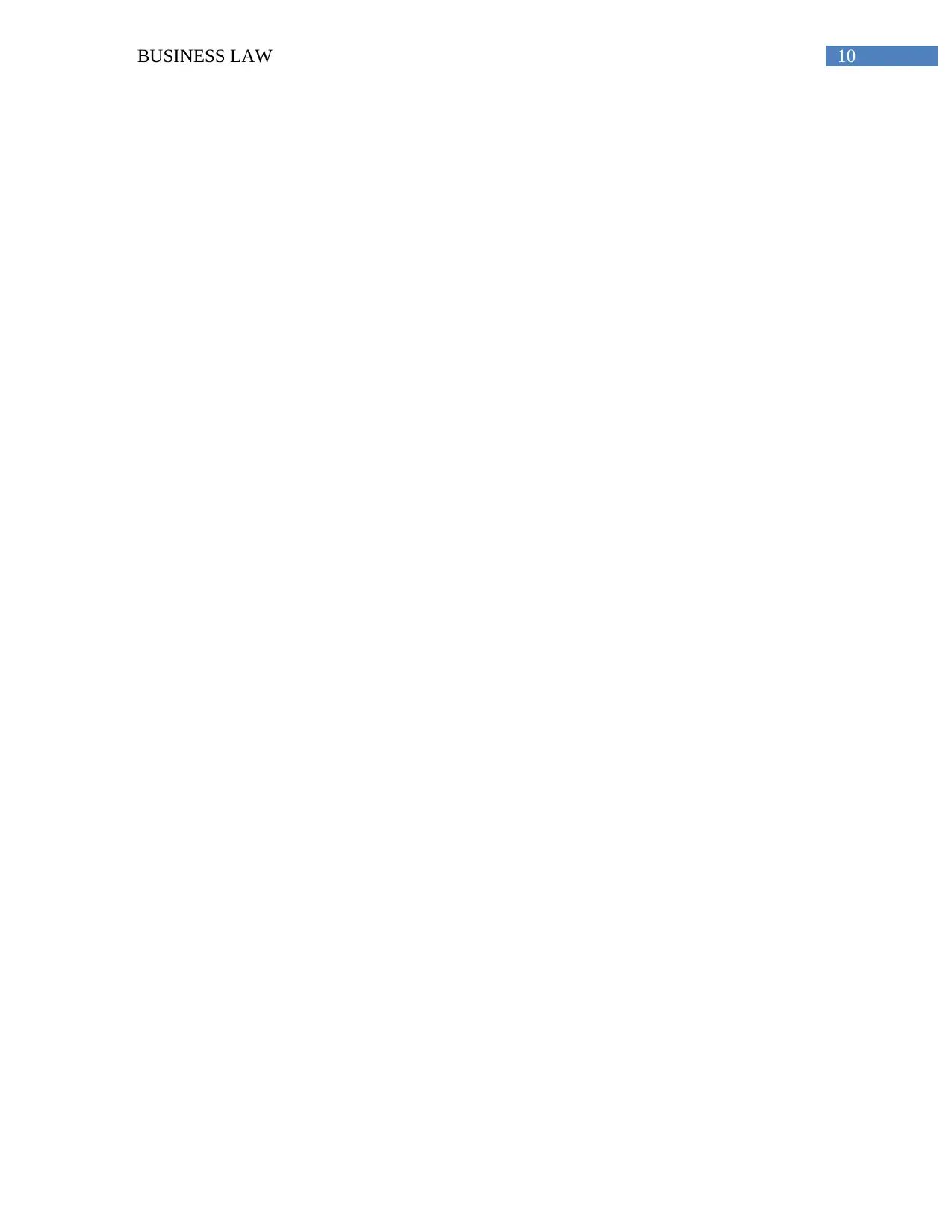
10BUSINESS LAW
1 out of 11
Related Documents
Your All-in-One AI-Powered Toolkit for Academic Success.
+13062052269
info@desklib.com
Available 24*7 on WhatsApp / Email
![[object Object]](/_next/static/media/star-bottom.7253800d.svg)
Unlock your academic potential
© 2024 | Zucol Services PVT LTD | All rights reserved.




